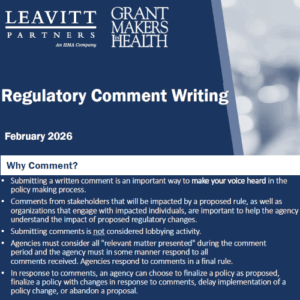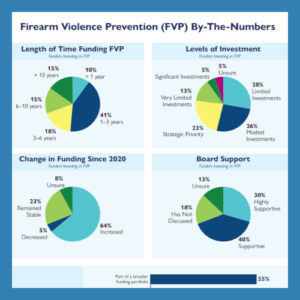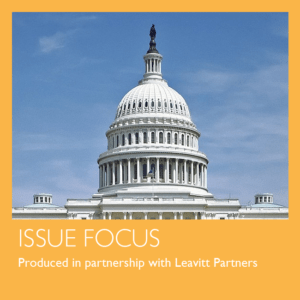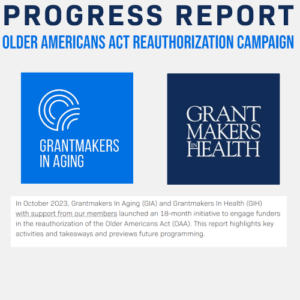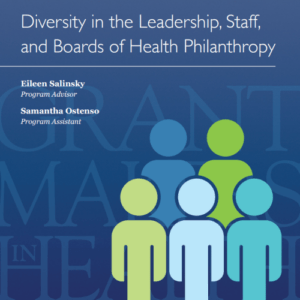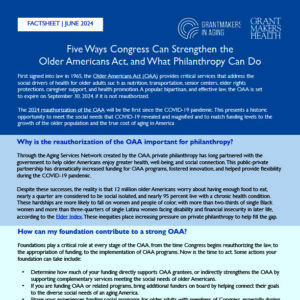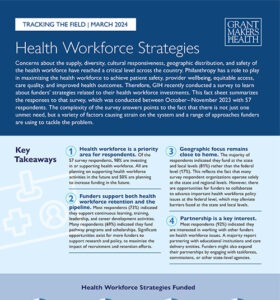Policy Resource: Regulatory Comment Writing
This resource provides an overview of how to write and submit a regulatory comment to the federal register.
2024 Survey Summary: Firearm Violence Prevention Strategies
GIH conducted a survey in September 2024 about funder engagement in firearm violence prevention. This fact sheet summarizes the survey results with a total sample of 81 health funders. This public health crisis and social justice issue is preventable, and health funders have an important role to play in advancing firearm violence prevention efforts.
Overview of Potential Medicaid Changes in 2025 Budget Reconciliation Bill
Budget reconciliation is a legislative tool that can be used by the majority party in Congress to advance their agenda with only a simple majority in the Senate. With slim Republican majorities in both the House and Senate, reconciliation provides an opportunity to pass key components of President Trump’s agenda, such as defense and border security funding, tax cuts, and spending cuts, without Democrat votes.
Progress Report: Older Americans Act Reauthorization Campaign
In October 2023, Grantmakers In Aging (GIA) and Grantmakers In Health (GIH) launched an 18-month initiative to engage funders in the reauthorization of the Older Americans Act (OAA). This report highlights key activities and takeaways and previews future programming.
Diversity in the Leadership, Staff, and Boards of Health Philanthropy
A new Grantmakers In Health survey of health funder leadership, staff, and boards found that health funder organizations are more racially and ethnically diverse than the broader field of philanthropy.
Fact Sheet: Five Ways Congress Can Strengthen the Older Americans Act, and What Philanthropy Can Do
First signed into law in 1965, the Older Americans Act (OAA) provides critical services that address the social drivers of health for older adults such as nutrition, transportation, senior centers, elder rights protections, caregiver support, and health promotion. A popular, bipartisan, and effective law, the OAA is set to expire on September 30, 2024, if it is not reauthorized. Foundations play a critical role at every stage of the OAA, from the time Congress begins reauthorizing the law, to the appropriation of funding, to the implementation of OAA programs. Now is the time to act.
Advancing Health and Creating Lasting Impact: MacKenzie Scott’s Grants to Health Foundations
In 2019, MacKenzie Scott announced that she was stepping into the world of philanthropy to give away her multi-billion-dollar fortune “until the safe is empty”. She has kept her word—to date, she has given away $16.5 billion. Her initial process for choosing which organizations would receive grants was shrouded in mystery. From 2019 to 2023, Scott used a process she termed “quiet research” to identify possible grantee organizations. The lucky organizations received a call from Scott’s consultants, who let them know they were receiving a grant for immediate use however they would like to spend it. In the Fall of 2022, Grantmakers In Health (GIH) became one of those grantee organizations, along with more than 20 health foundations. Two additional GIH Funding Partner organizations received gifts in 2020 and 2021, respectively.
2024 Survey Summary: Health Workforce Strategies
Concerns about the supply, diversity, cultural responsiveness, geographic distribution, and safety of the health workforce have reached a critical level across the country. Philanthropy has a role to play in maximizing the health workforce to achieve patient safety, provider well-being, equitable access, care quality, and improved health outcomes. Therefore, GIH recently conducted a survey to learn about funders’ strategies related to their health workforce investments.
Join & Become a GIH Funding Partner Today!
Click here to learn more about becoming a GIH Funding Partner and joining the largest national network of health funders.

